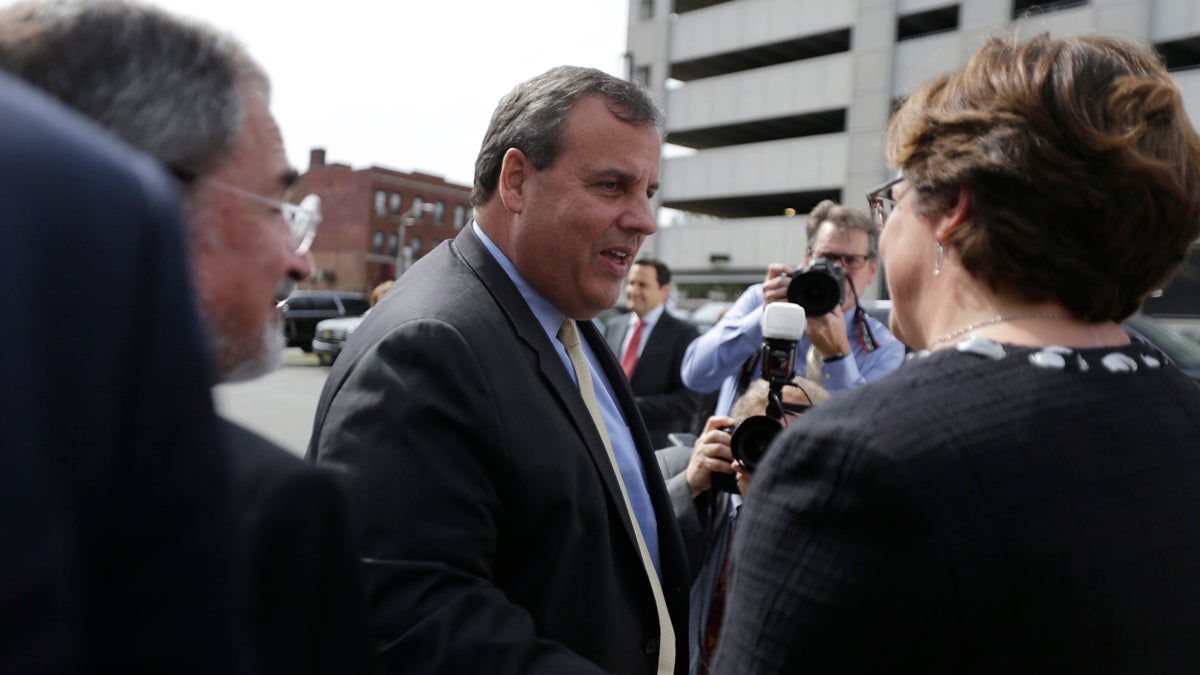Bridgegate Day 2: Gridlock, clandestine parking lot meeting, and New York Giants tickets

New Jersey Gov. Chris Christie is greeted as he arrives at University Hospital for the grand opening of the Rutgers Cancer Institute of New Jersey Tuesday. He did not answer questions about revelations at the Bridgegate trial. (AP Photo/Julio Cortez)
On the second day of the Bridgegate trial, two Fort Lee officials recounted what they experienced during four days of traffic gridlock more than three years ago.
Keith Bendul, chief of the Fort Lee Police Department, woke up Sept. 9, 2013, to radio transmissions describing overwhelming congestion leading onto the George Washington Bridge and “knew it was not going to be good, based on my experience.”
Bendul said the lane closures immediately posed a public safety risk, testifying that efforts to find a missing boy and aid a person in cardiac arrest were hampered by the delays.
“It was the worst traffic we’ve had to deal with” other than 9/11, he said.
Two former allies of Republican Gov. Chris Christie are accused of conspiring to close two of three local lanes to the bridge from Fort Lee to punish the borough’s Democratic mayor for not endorsing Christie for re-election.
After failed attempts to reach someone at the Port Authority, which operates the bridge, Bendul finally got in touch with bridge manager Robert Durando, who insisted on meeting in person in a parking lot.
Bendul said Durando seemed nervous and testified that the meeting had a “cloak and dagger” feel to it. Nonetheless an irate Bendul laid into Durando, telling him that if anyone died as a result of the traffic, “I’m going to tell those people to … sue you and everybody else at the Port Authority.”
Defense attorneys attempting to cast doubt on Bendul’s characterization of the meeting later revealed that Durando sent an email to his boss, David Wildstein, informing him of the encounter.
Wildstein, a former high-ranking Port Authority official, has pleaded guilty to his role in the scheme and will testify for the prosecution.
Also on the stand Tuesday was Fort Lee Mayor Mark Sokolich, who testified that repeated messages to his contact at the Port Authority, Bill Baroni, went unanswered during the four days of complete traffic gridlock in Fort Lee.
Baroni, former deputy executive director of the Port Authority, and Bridget Anne Kelly, former deputy chief of staff to Christie, are the defendants in the case.
Sokolich said the governor’s office had begun to court his endorsement a full year before the 2013 election by offering him tours of the 9/11 memorial, inviting him to holiday parties and lunches with the governor at Drumthwacket, and giving him tickets to New York Giants games.
“It wasn’t a comfortable place to be,” said Sokolich, a Democrat.
Once Sokolich decided not to endorse Christie, the lanes were closed.
Sokolich, who seemed at pains to recount the events of that week, said he attempted to reach Baroni several times that week but never succeeded. Finding no plausible reason for the lane closures besides retaliation, Sokolich even asked Baroni in one voicemail, “Who’s mad at me?”
Sokolich also said Tuesday that he still keeps a photo of himself and Baroni on his desk.
Testimony from Sokolich will continue on Wednesday.
WHYY is your source for fact-based, in-depth journalism and information. As a nonprofit organization, we rely on financial support from readers like you. Please give today.




